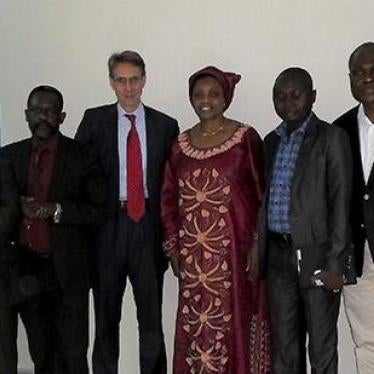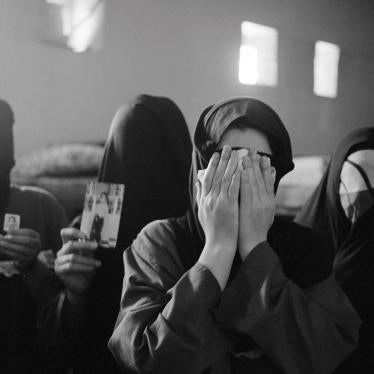Good afternoon and thank you all for being here today.
During the past week, I have been in eastern Congo and here in the capital, Kinshasa. I have met with inspiring and courageous Congolese human rights activists, victims of human rights abuses and their family members, political party leaders, members of the diplomatic community, the head of the UN peacekeeping mission in Congo, and government officials. Yesterday, I had a very frank and productive discussion with President Joseph Kabila.
I am here in the Democratic Republic of Congo because we at Human Rights Watch believe this is a critical moment in the country’s transition to greater democracy and respect for human rights. While we have seen some progress in reining in impunity and improving security in eastern Congo, we are deeply concerned about the repressive climate in advance of elections.
The Congolese people have suffered grievous human rights abuses during the many years of conflict and decades of dictatorship. Steps have been taken to end the conflict and increase respect for human rights. For that we applaud the efforts of Congo’s government, its institutions and its active and courageous civil society. But more is needed. The signs we are seeing and the abuses we are documenting worry us deeply. I have come to Congo to speak directly to government officials about my concerns about continuing serious human rights violations and their impact on the Congolese people.
Let me lay out the five major concerns I have raised in my meetings:
First, Human Rights Watch is deeply troubled by the crackdown on freedom of expression and assembly in recent months. Congolese security and intelligence officials have clamped down on activists, political leaders, and others who have opposed attempts to allow President Joseph Kabila to stay in power past his constitutionally mandated two-term limit. Across the country, authorities have sought to silence dissent through threats, arbitrary arrests, enforced disappearances and killings.
The security forces’ use of excessive force against demonstrations in Kinshasa and other cities in January is a prime example. Human Rights Watch documented that police and Republican Guard soldiers shot dead at least 38 people in Kinshasa and another 5 in Goma. Dozens were wounded, and at least 5 people in Kinshasa were forcibly disappeared.
Congo’s intelligence agency, the Agence Nationale de Renseignements (ANR), arrested about 30 participants at a pro-democracy workshop in Kinshasa – now known as the “Filimbi activists.” It is a disconcerting example of the government’s growing intolerance for basic freedom of expression and association. No evidence has been presented that any of the activists arrested or other Filimbi leaders were involved in violent insurrection or terrorism, as some authorities have alleged.
The ANR held several Filimbi activists for prolonged periods without charge, without bringing them before a judge or allowing them access to lawyers, as Congo’s constitution and international law require. Activists in Goma who peacefully protested the arrests of their colleagues in Kinshasa were themselves arrested, and in some cases intelligence agents and police badly beat and even tortured them through a form of waterboarding. No one has been investigated, let alone punished, for these serious abuses.
Other prominent activists and political party leaders remain in detention, facing trumped-up charges for speaking out against efforts to allow President Kabila to stay in power past 2016.
In my meetings this week, I have called on Congolese authorities to immediately and unconditionally release prisoners held for their political views or participation in peaceful activities. This includes the youth activists Fred Bauma and Yves Makwambala; the human rights defender Christopher Ngoyi; and the political party leaders Jean-Claude Muyambo, Ernest Kyaviro, Cyrille Dowe, Jean-Bertrand Ewanga, and Vano Kiboko.
Releasing these individuals is necessary if the government wishes to demonstrate that it is serious about holding credible elections and respecting human rights.
Second, I have urged Congolese authorities to exhume the bodies from the mass grave in Maluku, outside Kinshasa, with the support of international experts. Many Congolese and others have expressed concerns that people killed by security forces could be among those buried there.
Yesterday, I met with several family members who had filed a joint complaint with Congo’s national prosecutor calling for justice and a credible investigation into the mass grave. They told me that their loved ones were shot dead or forcibly disappeared during the January demonstrations in Kinshasa or during the brutal police campaign known as “Operation Likofi.” They are still waiting to find their relatives’ bodies and are unable to organize funerals. These families desperately want to learn the truth about their family member’s fate and they deserve justice.
The government has yet to address these concerns and exhume the bodies. They should delay no more.
Third, Human Rights Watch remains concerned at the lack of progress on holding accountable those responsible for the serious human rights violations during Operation Likofi. The police have a duty to protect the population by tackling gang violence in Kinshasa. But those goals cannot be achieved with extrajudicial killing and enforced disappearances. Human Rights Watch documented the summary execution of at least 51 young men and boys and the forced disappearance of at least 33 others during Operation Likofi.
The government said in November 2014 that it had begun investigating the crimes committed during Operation Likofi and that a report would be published by the end of the year. But no report has yet been published and no senior police officers have been arrested or held accountable for the crimes.
In my meetings this week, I urged Congolese authorities to investigate and appropriately prosecute the security force officials responsible for these serious abuses. Gen. Célestin Kanyama, who commanded Operation Likofi, should be suspended immediately pending a full investigation of his command responsibility for the abuses.
Fourth, allow me to turn to the situation in eastern Congo. There has been notable progress in bringing those responsible for grave international crimes to justice. The March 2013 surrender and transfer to the International Criminal Court of the rebel leader and former army general Bosco Ntaganda was a landmark development for international justice and the fight against impunity in Congo. Congo has cooperated more with the ICC in the transfer of suspects to The Hague than any other country.
The demise of the abusive M23 rebel group and the subsequent surrender of several thousand fighters from numerous armed groups were also significant developments. Several hundred army soldiers have been arrested and prosecuted for rape in recent years, including a general, and the army has started implementing a comprehensive Action Plan to tackle sexual violence by soldiers. These are important developments for human rights.
Yet the vast majority of those responsible for serious abuses in eastern Congo remain unpunished, and the trials that have taken place have often been plagued by serious problems. Dozens of armed groups are still active in the east and many senior commanders with long records of human rights abuses remain at large.
This needs to change. Congolese human rights groups have repeatedly called for a new justice mechanism to deal with investigating and trying all those who bear the greatest responsibility for serious human rights violations.
Human Rights Watch echoes that call. In my meetings I urged the Congolese government to move forward with its proposal to establish a specialized justice mechanism involving international experts to prosecute war crimes and crimes against humanity committed in Congo. The government has made a real effort to pass such legislation and we encourage them not to give up. I particularly want to urge the Congolese National Assembly and Senate to pass the government’s law when it is next presented to them.
Finally, I want to raise the cases of two criminal suspects sought for grave crimes who remain at large:
- Sylvestre Mudacumura, the leader of the rebel armed group FDLR, who has been under an arrest warrant by the International Criminal Court for three years for nine counts of alleged war crimes.
- Ntabo Ntaberi Sheka, wanted on a Congolese arrest warrant issued in January 2011 for alleged crimes against humanity for the mass rape of nearly 400 people in 2010.
The failure of the government to arrest them years after the warrants were issued has meant that troops under their command are still committing horrific abuses against civilians. I have called on the Congolese government along with the UN mission in Congo, MONUSCO, to urgently take action to arrest these two men. Doing so will send a signal that an arrest warrant is not simply a piece of paper that gathers dust. Rather it is a call to action to end human rights abuses and seek justice for the victims.
Thank you.







